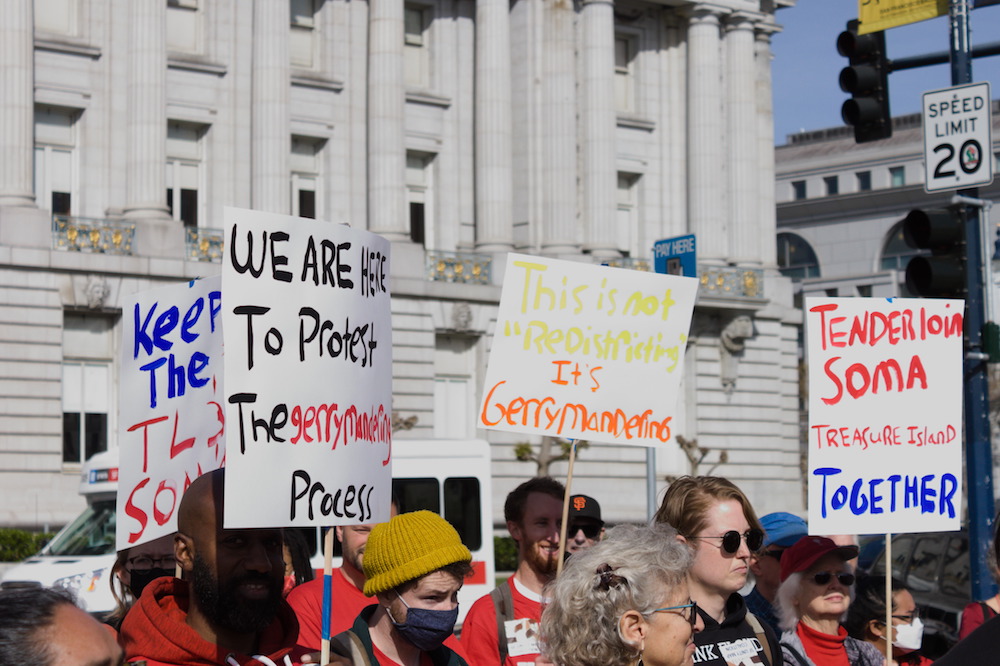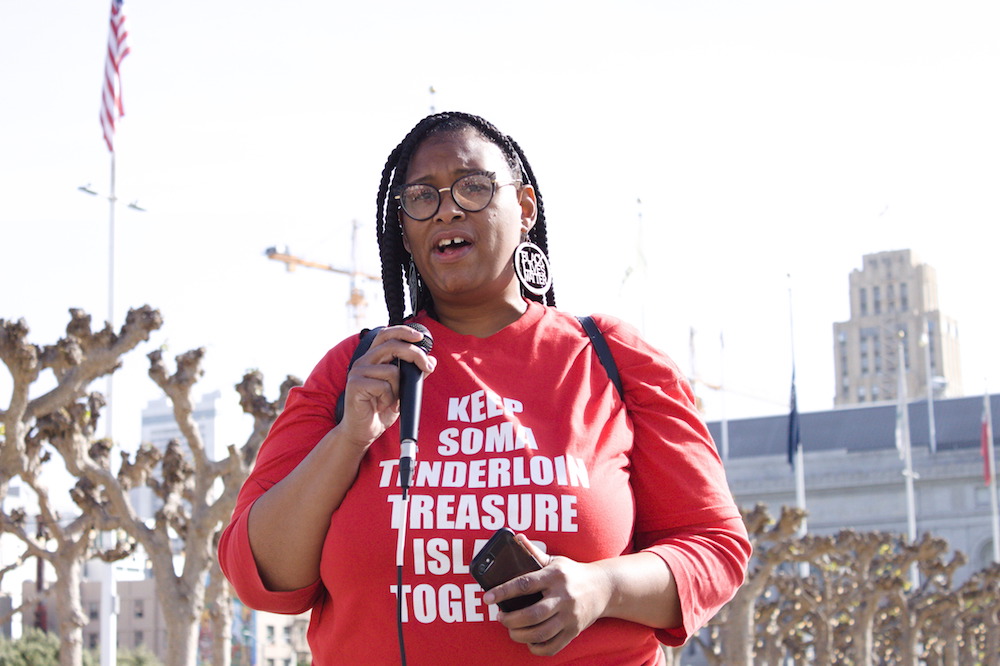The entire redistricting process was thrown into an uproar yesterday, as the Elections Commission set a special meeting for Friday/8 to decide if it should remove its three appointees to the Redistricting Task Force.

The move came after Asian Americans Advancing Justice/ Asian law Caucus, the League of Women Voters, which is not a partisan organization, and the ACLU wrote letters to the commission expressing serious concern about the way the task force has been drawing lines.
From AAAJ and the LWV:
For months, dozens of historically and systemically excluded communities in San Francisco have put in substantial time and effort to tell the task force about their communities of interest and how their communities should be respected in the draft maps. Yet, with just a few days left in the mapping process, the needs of many of those groups have been left out of the draft supervisor maps made by the task force. Map 4D received overwhelming community support and was advanced by the task force. Yet, at 2:53am on Tuesday, April 5, the task force reversed its previous decision to advance map 4D, and voted map 4B forward instead. Major decisions that affect San Franciscans for the next ten years should not be made in the early hours of the morning without public oversight and transparency. We call upon you to take action and speak to the Redistricting Task Force members who were appointed by the Elections Commission and reinforce to them their duty and obligations to give due weightto the public input of historically and systemically marginalized, vulnerable, and disadvantaged communities. We also recommend you call a special meeting ofthe Elections Commission as soon as possible regarding these urgent concerns
From the ACLU:
This Commission has a duty, under Ordinance 094-21 (BOS File No. 20606), to the public and the city to ensure that its appointees carry out their duties. As noted by the League in its letter to this Commission, the City Attorney has explained that the Task Force “is responsible for redrawing supervisorial district lines in accordance with the law and for making appropriate adjustments based on public input provided at community meetings.” This includes the duty to draw districts that “reflect communities of interest within the City and County” (S.F. Charter § 13.110(d)). The people of San Francisco have turned out to the Task Force’s meetings for months to give feedback, describe their communities of interest, and express their needs to the Task Force. However, the Task Force has minimized these communities’ input despite their substantial time and effort. The Task Force has also made the mapping process difficult, and the public’s ability to provide meaningful feedback on the proposed maps is next to impossible by scrapping draft after draft.
And Oh, the Horror from the mayor and State Sen. Scott Wiener.
From Breed:
The volunteer members of the Redistricting Task Force appointed by the Elections Commission have been receiving public feedback and working on these issues for months. These are San Francisco residents who have given their time and effort, and who were all selected as part of a thorough and transparent selection process by the Elections Commission ten months ago. Now, at the last minute, they are being threatened with removal.
This undermines and corrupts what is supposed to be a transparent and non-partisan process. This is neither transparency nor good government. The Elections Commission should recognize that a decision to remove members of the public who have served this city for months would destroy the integrity of the redistricting process. Let’s finish the process as it’s designed and allow the appointed members of the body to exercise their independence free from threats or attacks.
From Wiener:
Let’s be clear: The Elections Commission’s move, under political pressure, to replace its appointees would send a clear signal that San Francisco’s redistricting process is about raw, hardball political power and nothing else. If the Elections Commission takes this shady step — not based on inability of its appointees to perform their roles but rather on disagreement with their votes on redistricting maps — the integrity of the independent redistricting process will be severely and permanently damaged. The public will understandably and reasonably view the redistricting process as hyper-politicized, which is exactly what the voters’ creation of an independent redistricting task force was supposed to avoid.
Here’s why this is such rank hypocrisy:
Several sources close to the task force have repeatedly told me what everyone else at City Hall already knows (and Breed has never denied): The Mayor’s Office is already playing a huge role in this process. Her allies, funded by the same big money that has tried to undermine progressive power in the city, are actively organizing to do what has never been done since district elections started in 1978: Use the process for a specific political agenda.
The Task Force has not even remotely “exercised independence.” If it had, then the map that was approved 8-1 a week ago would still be the working map.

Wiener is right: What is happening here is indeed is “about raw, hardball political power.” It’s not the ACLU and AAAJ that are doing that, and it’s not the hundreds of community members who have tried over and over again to get a map that is as nonpartisan as the maps have always been.
Let’s look at who is behind this new group called Connected SF, which is actively working to push district lines that would make it easier to elect allies of the mayor. From an email linked to the group:
Connected SF is leading the Redistricting drive to capture moderate majorities in Supervisor Districts which will ensure moderate centrist candidates are elected in the future.
We will never fix San Francisco without a centrist, moderate Board of Supervisors for the Mayor to work with.
We are in the final week of the Redistricting process and it is going better than I could have ever dreamed. The current draft map, 4B, will flip 3 districts with Progressive Supervisors to moderate majorities and make 2 other districts which are currently Progressive majority, competitive with a 50/50 voting block split. But it ain’t over til its over. The Progressives have run circles around us for years. They are far better organized then us. The City budget is the source of 95% of their capital and they fight like hell for it.
According to documents filed with the Attorney General’s Registry of Charitable Trusts, Connected SF is run by three people: Lanier Coles, Angelique Mahan, and Janan New.
Coles and others, including real-estate developer Nick Podel, who is on the board of Neighbors for a Better San Francisco, the right-wing group that tried to defeat progressives two years ago and is now trying to recall DA Chesa Boudin, wrote an oped piece for the Marina Times in January laying out their strategy.
New is the executive director of the San Francisco Apartment Association and longtime landlord lobbyist.
So the real-estate folks, who don’t like the progressive majority on the Board are openly trying to gerrymander the lines.
The three appointees of the Elections Commission serve at the pleasure of that panel, which will be under immense pressure tomorrow. But at stake is not just the future of progressive politics in the city but the ability of the Task Force to resist political pressure and do what its predecessors have done since 1978: Draw lines that reflect what the community wants without any partisan agenda.
Yes, partisan: Everyone in elected office in San Francisco is a Democrat, but in reality we have two very distinct political parties, the progressives, and the conservatives who call themselves moderates. They have very different political agendas. And this line-drawing is, by any reasonable account, partisan.





